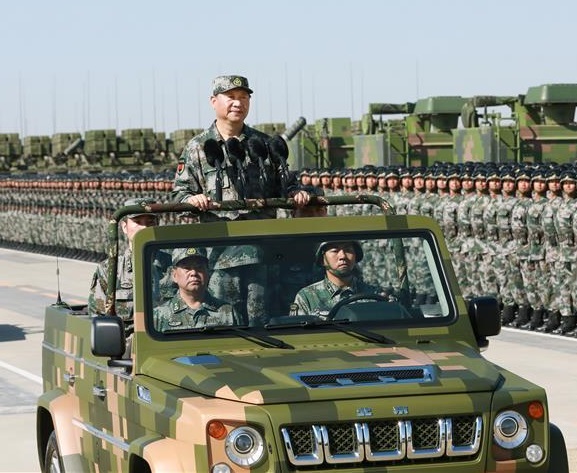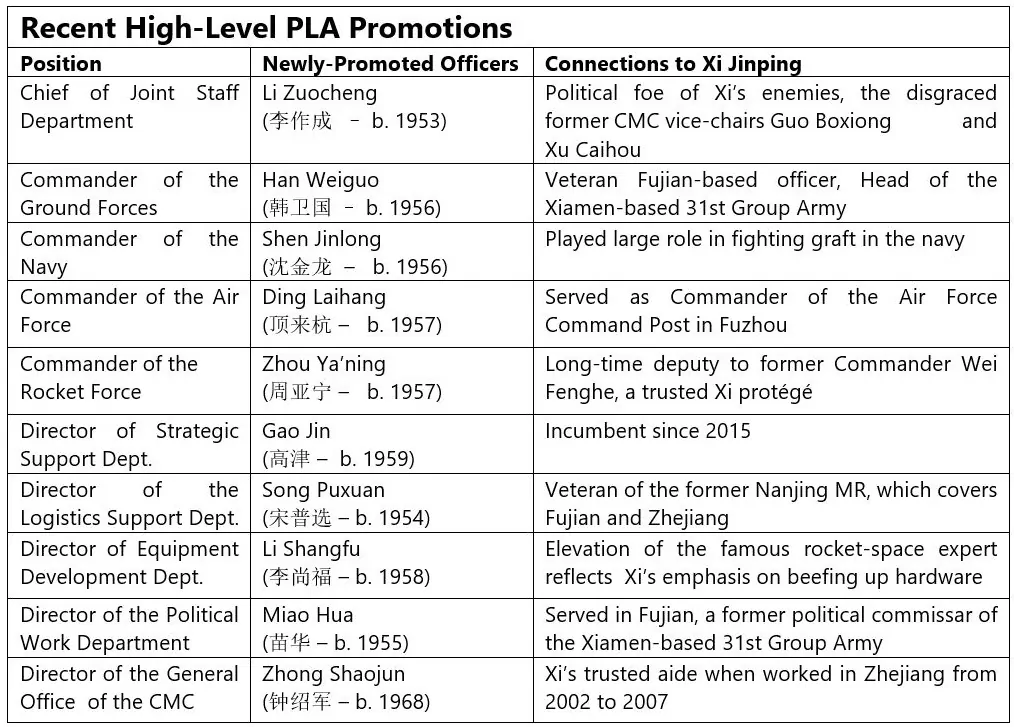
The Irresistible Rise of the “Xi Family Army”
The Irresistible Rise of the “Xi Family Army”
Under President Xi Jinping, whose main power base is the People’s Liberation Army, the famous adage “power grows out of the barrel of a gun” has assumed added significance (China Brief, February 15, 2013; January 9, 2015). On the eve of the 19th National Congress of the Chinese Communist Party (CCP), Xi has demonstrated his ironclad control over the PLA brass by filling a dozen-odd senior post with his protégés. Such large-scale personnel changes so close to the quinquennial congress are extremely rare in the tradition of the Party and army. The appointments seem to be Xi’s way of telling real and potential foes that nobody can challenge his status as “core leader” and “supreme military commander” (zuigaotongshuai – 最高统帅) due to his solid grip on the barrel of the gun.
Xi’s cobbling together a so-called “Xi’s Family Army” (xijiajun – 习家军) has followed in the wake of the ongoing comprehensive restructuring of the PLA command-and-control apparatus which began in December 2015 and January 2016. To celebrate the 90th anniversary of the establishment of the Red Army, on July 30 Xi, who chairs the Central Military Commission (CMC), presided over a military parade in the Zhurihe Base in Inner Mongolia. Unlike such spectacles in the past, Xi was the only Politburo Standing Committee (PBSC) member present. Also in a departure from tradition, former top leaders such as former presidents Jiang Zemin and Hu Jintao were absent from the scene. Even the rhetoric of these highly scripted events was changed. Instead of addressing Xi as “leader” (shouzhang – 首长), troops being inspected gave him the more elevated title of “chairman” (zhuxi – 主席) (Voice of America, August 1; Phoenix TV, July 30). The core leader’s machinations just two months before the 19th Party Congress are geared toward asserting his authority in dictating personnel arrangements and other polices at the CCP conclave.
The recent spate of reshuffles at the PLA’s top echelons seems to be a precursor of large-scale personnel changes in the Party’s Central Committee, the Politburo and the PBSC. For the sake of further centralization of power, the membership of the CMC is expected to shrink from the usual ten or eleven to just five: one chairman and four vice-chairmen. This breaks with the long-standing tradition that the heads of the four major PLA divisions—the Ground Forces, Navy, Air Force and Rocket Forces—would be represented at the Commission. With Xi at the helm, the four vice-chairmen are expected to be the following veteran generals: incumbent Vice-Chairman Xu Qiliang (许其亮 – b. 1950); former director of the Equipment Development Department Zhang Youxia (张又侠 – b. 1950); former Rocket Forces Commander Wei Fenghe (魏凤和 – b. 1954); and newly promoted Chief of the General Chiefs Department Li Zuoucheng (李作成 – b. 1953). General Xu, a Politburo member since 2012, will likely retain his position in the elite body. General Zhang is deemed to have the highest chance of inheriting the Politburo slot left by the retiring CMC vice-chairman, General Fan Changlong (范长龙 – b. 1947) (Brookings.edu, September 19; Sing Tao Daily [Hong Kong], September 1).
Although not usually considered a member of the Xi Jinping Faction, Xu has earned Xi’s trust after professing his loyalty to the “core leader.” He will remain CMC Vice-Chairman for five more years. The former Air Force chief is expected to be put in charge of military reform, political discipline, and fighting corruption. Zhang Youxia, the former Director of the Equipment Development Department, is, like Xi, a princeling (offspring of party elders and senior cadres). He is the son of General Zhang Zongxun (张宗逊), who was a crony of Xi’s father, the late vice-premier Xi Zhongxun (习仲勋). General Zhang will be responsible for weapons modernization and logistics (Zaobao.com [Singapore], September 2; Sing Tao Daily, August 28). Wei Fenghe, a veteran of the former Second Artillery Forces has earned Xi’s respect for masterminding the modernization of China’s missiles. As a result, he was the first senior officer to have been conferred full general status by Xi after the latter became CMC Chairman in late 2012. A former commander of the Rocket Forces, Wei’s new mission will be to challenge the dominance of U.S. and Russia in missiles and space-related technology. General Li, a former commander of the Ground Forces, has been repeatedly promoted in the past two years. The Chinese media noted that while Li was a much-decorated hero of the Sino-Vietnamese War (1979), he was passed over for promotion largely because he refused to bribe the underlings and cronies of the two corrupt former CMC vice-chairmen the disgraced General Guo Boxiong and General Xu Caihou. For example, it took Li ten years to advance from the position of Head of the then 41st Group Army (1998) to Vice-Commander of the then Chengdu Military Region (2008). And while Li became a major general in 1997, it took him 12 years to be elevated to Lieutenant-General. General Li will take charge of day-to-day military operations, including troop movements and other deployments within the five newly formed Theatre Commands. (Dwnews.com [Beijing], September 10; Ming Pao [Hong Kong], August 28; Caixin.com, August 27; Military.China.com, April 1, 2016).
An examination of promotions over the last two months throws the true nature of the ‘Xi Army’ into sharp relief. A disproportionately large number of these future top military leaders earned their spurs in Fujian and Zhejiang provinces, where Xi served as a senior regional cadre from 1985 to 2007. Take, for example, the elevation of Han Weiguo (韩卫国 – b. 1956) as Commander of the Ground Forces, the appointment of Miao Hua (苗华 – b. 1955) as Director of the Political Work Department, and the promotion of Ding Laihang (丁来杭 – b. 1957) as Air Force Commander. All three had worked in Fujian, where Xi served in various positions, including provincial governor, from 1985 to 2002. Gen. Han began his military career in Fujian and is a former Head of the Xiamen-based 31st Group Army (now the 73rd Group Army). Similarly, Miao Hua, a former political commissar of the Navy, is also a former political commissar of the 31st Group Army. And General Ding had served in a Fuzhou-based Air Force regiment (Wen Wei Po [Hong Kong], September 8; Oriental Daily News [Hong Kong], September 2; Radio Free Asia, September 1; China Times [Taipei], August 29). Other Xi protégés elevated on the eve of the 19th Party Congress include Song Puxuan (宋普选 – b. 1954). A former Commander of the Northern Theater Command, General Song was named Director of the Logistics Support Department in early September. He is a former vice-commander of the now-defunct Nanjing Military Region (MR), which included Fujian and Zhejiang provinces. The youngest rising star among the top brass, Zhong Shaojun (钟绍军 – b. 1968), who doubles as Director of the Office of the CMC Chairman as well as Vice-Director of the General Office of the CMC, was made Director of the CMC General Office, the PLA’s nerve center in September. Zhong’s rise can almost certainly be traced to a connection established when he was Xi’s personal secretary when the latter was Party Secretary of Zhejiang from 2002 to 2007 (Apple Daily [Hong Kong], September 14; South China Morning Post, September 13; Dwnews.com, August 23).
The extraordinarily speedy elevation of General Han illustrates the lengths to which Xi has gone in reserving top spots for officers whose fealty is beyond doubt. Han was a vice-commander of the then Beijing MR when he was made Lieutenant-General in July 2015; seven months later he was appointed Commander of the Central Theater Command. The native of Hebei Province was made a full general on July 28, 2017; two days later he became the commander of the nationally televised Military Parade in Inner Mongolia that was presided over by President Xi. A week or so later, he replaced Li Zuocheng as Commander of the Ground Forces (People’s Daily, September 1; South China Morning Post, September 1).

Supreme Military Commander Xi has also taken advantage of the proximity to the 19th Party Congress to weed out any “residual poison” (yudu – 余毒) left by his two arch enemies, the disgraced CMC Vice-Chairmen Guo Boxiong and Xu Caihou. Fang Fenghui, a former commander of the erstwhile Beijing MR and the first Chief of the Joint Staff, was unceremoniously sacked in the summer. The same was true of veteran political commissar and the first director of the Political Work Department Zhang Yang. Generals Fang and Zhang, who are under investigation for corruption, owe their illustrious careers at least partly to the patronage of Generals Guo and Xu. Given that Generals Guo and Xu were very close to former President Jiang Zemin, and that former president Hu Jintao largely went along with Jiang’s personnel arrangements in the PLA, these personnel movements lend credence to the theory that Xi wants at the same time to minimize the residual influence of the two former presidents and CMC chairmen (Bloomberg, September 6; HK01.com, September 1).
Yet Xi has apparently disregarded military traditions and professional criteria (including the all-important grade system) by elevating so many of his cronies and protégés to top slots. Despite the apparent success of his one-and-a-half-year effort to streamline the command-and-control apparatus, Xi’s personal ambition and his obsession of the loyalty of his aides has dealt a big blow to the PLA’s professional standards. As is the case of human resources management in civilian sectors, the promotion of senior military staff is supposed to follow two principles: that members of the top brass should come from the proverbial “five lakes and four seas” and that they must be “red and expert.” “Five lakes and four seas” refers to the imperative of factional, functional and geographical diversity; “red and expert” refers to the fact that while political loyalty is important, senior officers must have professional competence and notable track records. As the paramount leader indicated is his book Xi Jinping: The Governance of China, “Good cadres are those who are conversant with politics and knowledgeable about their professions… who are both red and expert.” (Hebei Daily, December 3, 2016; People’s Daily, December 25, 2014).
The military media has disclosed that PLA anti-corruption authorities handled 4,000 cases of investigation in the past five years, as a result of which 14,000 officers were disciplined for graft and related crimes (Ming Pao, September 22; Liberation Army Daily, September 20). Despite President Xi’s efforts to purge the ranks of corruption, disciplinary problems remain serious. A key reason for these problems in both civilian and military sectors, according to President Xi, is the prevalence of “factions and cliques” (tuantuanhuohuo – 团团伙伙) (People’s Daily, March 22; China News Service, February 16, 2016). The extraordinary “helicopter rides” enjoyed by newly promoted Xi protégés such as Generals Han Weiguo and Zhong Shaojun, however, seem to be based on Xi’s confidence in their loyalty rather than the latter’s having demonstrated exemplary professional abilities. Despite the leaps-and-bounds modernization of weaponry, the dearth of professional standards in the armed forces could jeopardize Xi’s goal of closing the military gap with the United States by 2049 at the latest.
Dr. Willy Wo-Lap Lam is a Senior Fellow at The Jamestown Foundation. He is an Adjunct Professor at the Center for China Studies, the History Department and the Program of Master’s in Global Political Economy at the Chinese University of Hong Kong. He is the author of six books on China, including Chinese Politics in the Era of Xi Jinping (Routledge 2015) and most recently editor of the Routledge Handbook of the Chinese Communist Party (2017).


